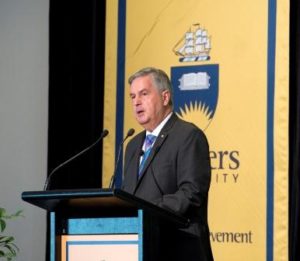
The former Governor of South Australia, Kevin Scarce, has launched a fierce defence of Australian ship building and called for a mature debate on the costs and benefits of a nuclear industry at Flinders University’s 2014 Investigator Lecture.
During his lecture, titled Divided we fall: Finding a shared vision for South Australia’s economic transformation, he said South Australians must overcome their differences and change their mindsets for the state to prosper.
The retired Rear Admiral, and former Head of Maritime Systems at the Defence Materiel Organisation, handed a stinging rebuke to “self serving” Federal politicians who he said criticised the local industry when they were aware of the support being provided to other nations they were comparing Australia against.
Mr Scarce, who was one of the main drivers of the Shaping the Future of SA program jointly funded and developed by Bank SA, Flinders University, CEDA, the State Government and KPMG, said that with the impending closure of Holden, the defence industry remained a viable option for any displaced Australian workforce.
Speaking at the Adelaide Festival Centre last night, he attacked “unfounded speculation” in the media about significant premiums on local shipbuilding – some of which he said included “simply outrageous” claims.
Mr Scarce told his audience that the basis of such claims was rarely discussed, or even disclosed, and remarked that “fiction soon becomes fact” if unchallenged.
He said he was not calling for a subsidised industry but that people should stop thinking of investment in shipbuilding as a pure cost and start thinking of it as an investment in the advanced manufacturing industries needed to sustain a modern global economy.
Mr Scarce said Australia had already successfully built ten Anzac Class frigates and that it could achieve the same standard again if the Federal Government could overcome successive failures to commit to a long term plan.
On the subject of nuclear energy, he said the State’s major political parties had so far been unwilling to engage in a serious debate, and that the value of sizeable deposits of uranium at Olympic Dam might be considerably enhanced if they did.
He said Australia had 30 per cent of the world’s known uranium deposits, but that its nuclear industry employed around 1,200 people and added very little to national GDP.
Mr Scarce said technology was changing so rapidly that Australia should be actively monitoring progress rather than keeping a closed mind on the subject.
More than 300 people were expected to attend this year’s Investigator Lecture, which is a major public event on Flinders University’s calendar and is named after Matthew Flinders’ ship The Investigator.
Also at this year’s Lecture, Flinders Alumnus Matt Johnson was honoured with a Distinguished Alumni Award, which recognised his professional achievements and significant service to Flinders University and the state of South Australia.
Mr Johnson has recently returned to Adelaide from a posting as Deputy Agent-General in London, and is currently Executive Director, Investment, Trade and Strategic Projects at the Department of State Development.

